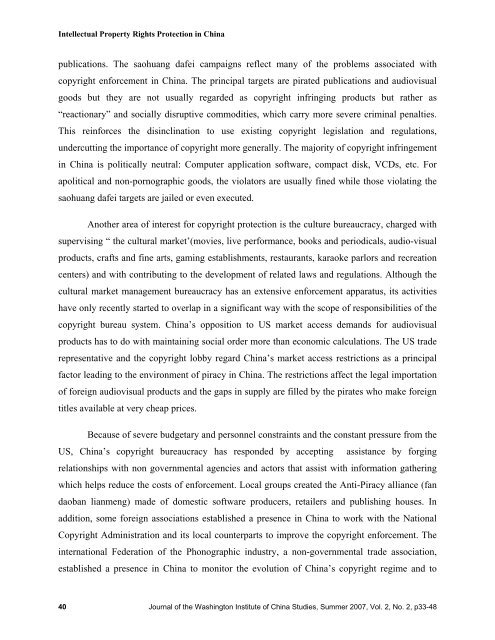Intellectual Property Rights Protection in China - wics-usa.org
Intellectual Property Rights Protection in China - wics-usa.org
Intellectual Property Rights Protection in China - wics-usa.org
Create successful ePaper yourself
Turn your PDF publications into a flip-book with our unique Google optimized e-Paper software.
<strong>Intellectual</strong> <strong>Property</strong> <strong>Rights</strong> <strong>Protection</strong> <strong>in</strong> Ch<strong>in</strong>a<br />
publications. The saohuang dafei campaigns reflect many of the problems associated with<br />
copyright enforcement <strong>in</strong> Ch<strong>in</strong>a. The pr<strong>in</strong>cipal targets are pirated publications and audiovisual<br />
goods but they are not usually regarded as copyright <strong>in</strong>fr<strong>in</strong>g<strong>in</strong>g products but rather as<br />
“reactionary” and socially disruptive commodities, which carry more severe crim<strong>in</strong>al penalties.<br />
This re<strong>in</strong>forces the dis<strong>in</strong>cl<strong>in</strong>ation to use exist<strong>in</strong>g copyright legislation and regulations,<br />
undercutt<strong>in</strong>g the importance of copyright more generally. The majority of copyright <strong>in</strong>fr<strong>in</strong>gement<br />
<strong>in</strong> Ch<strong>in</strong>a is politically neutral: Computer application software, compact disk, VCDs, etc. For<br />
apolitical and non-pornographic goods, the violators are usually f<strong>in</strong>ed while those violat<strong>in</strong>g the<br />
saohuang dafei targets are jailed or even executed.<br />
Another area of <strong>in</strong>terest for copyright protection is the culture bureaucracy, charged with<br />
supervis<strong>in</strong>g “ the cultural market’(movies, live performance, books and periodicals, audio-visual<br />
products, crafts and f<strong>in</strong>e arts, gam<strong>in</strong>g establishments, restaurants, karaoke parlors and recreation<br />
centers) and with contribut<strong>in</strong>g to the development of related laws and regulations. Although the<br />
cultural market management bureaucracy has an extensive enforcement apparatus, its activities<br />
have only recently started to overlap <strong>in</strong> a significant way with the scope of responsibilities of the<br />
copyright bureau system. Ch<strong>in</strong>a’s opposition to US market access demands for audiovisual<br />
products has to do with ma<strong>in</strong>ta<strong>in</strong><strong>in</strong>g social order more than economic calculations. The US trade<br />
representative and the copyright lobby regard Ch<strong>in</strong>a’s market access restrictions as a pr<strong>in</strong>cipal<br />
factor lead<strong>in</strong>g to the environment of piracy <strong>in</strong> Ch<strong>in</strong>a. The restrictions affect the legal importation<br />
of foreign audiovisual products and the gaps <strong>in</strong> supply are filled by the pirates who make foreign<br />
titles available at very cheap prices.<br />
Because of severe budgetary and personnel constra<strong>in</strong>ts and the constant pressure from the<br />
US, Ch<strong>in</strong>a’s copyright bureaucracy has responded by accept<strong>in</strong>g assistance by f<strong>org</strong><strong>in</strong>g<br />
relationships with non governmental agencies and actors that assist with <strong>in</strong>formation gather<strong>in</strong>g<br />
which helps reduce the costs of enforcement. Local groups created the Anti-Piracy alliance (fan<br />
daoban lianmeng) made of domestic software producers, retailers and publish<strong>in</strong>g houses. In<br />
addition, some foreign associations established a presence <strong>in</strong> Ch<strong>in</strong>a to work with the National<br />
Copyright Adm<strong>in</strong>istration and its local counterparts to improve the copyright enforcement. The<br />
<strong>in</strong>ternational Federation of the Phonographic <strong>in</strong>dustry, a non-governmental trade association,<br />
established a presence <strong>in</strong> Ch<strong>in</strong>a to monitor the evolution of Ch<strong>in</strong>a’s copyright regime and to<br />
40<br />
Journal of the Wash<strong>in</strong>gton Institute of Ch<strong>in</strong>a Studies, Summer 2007, Vol. 2, No. 2, p33-48


